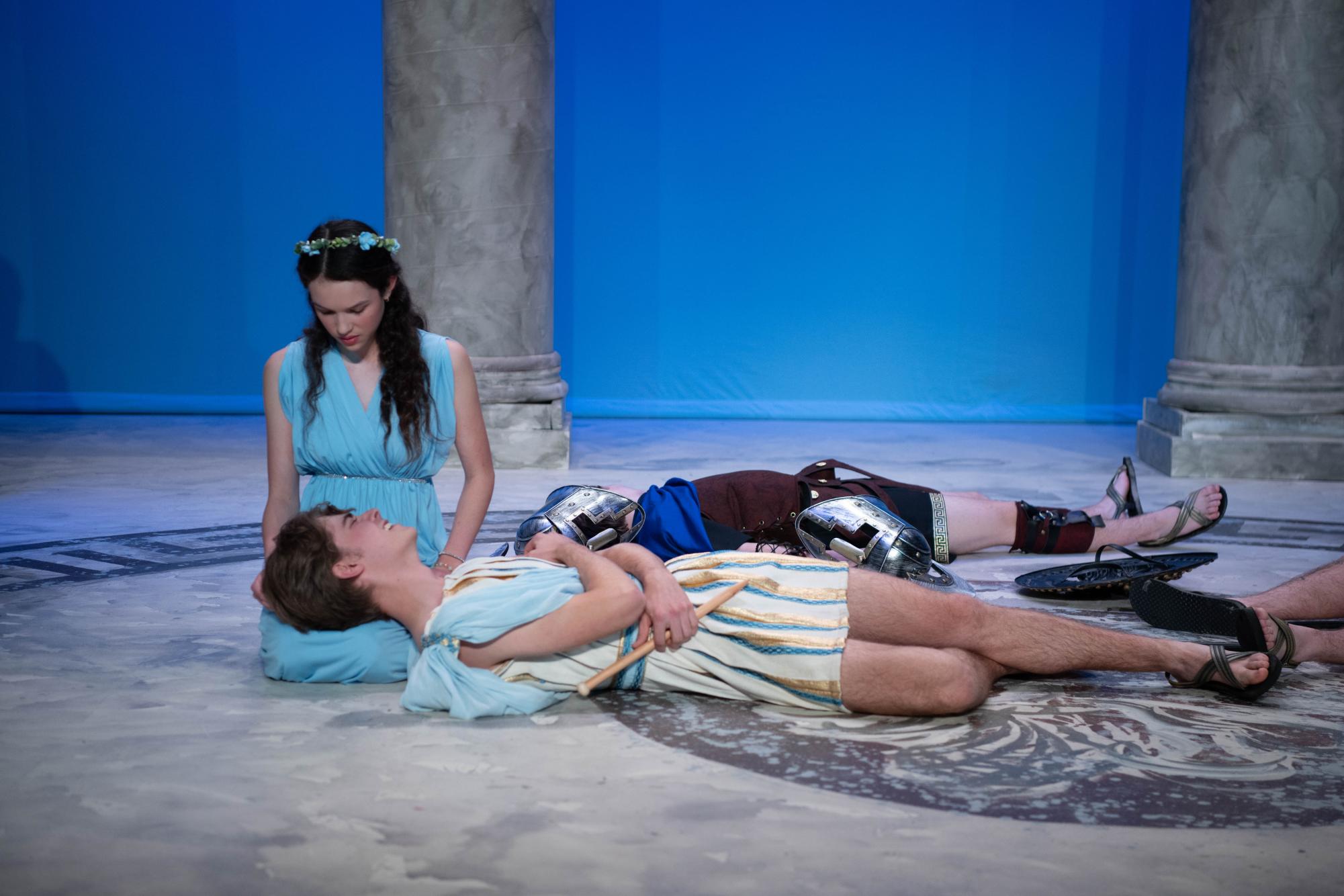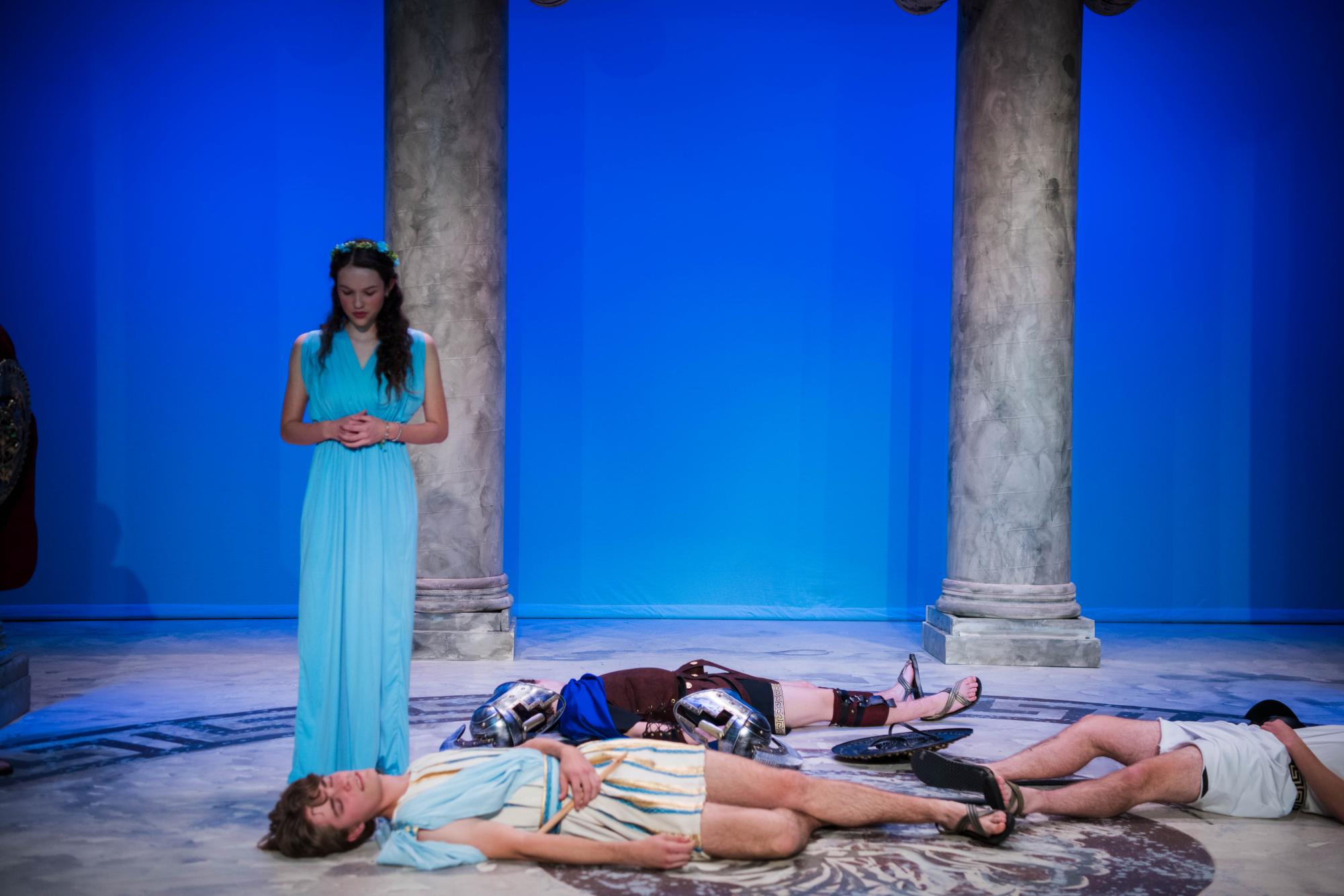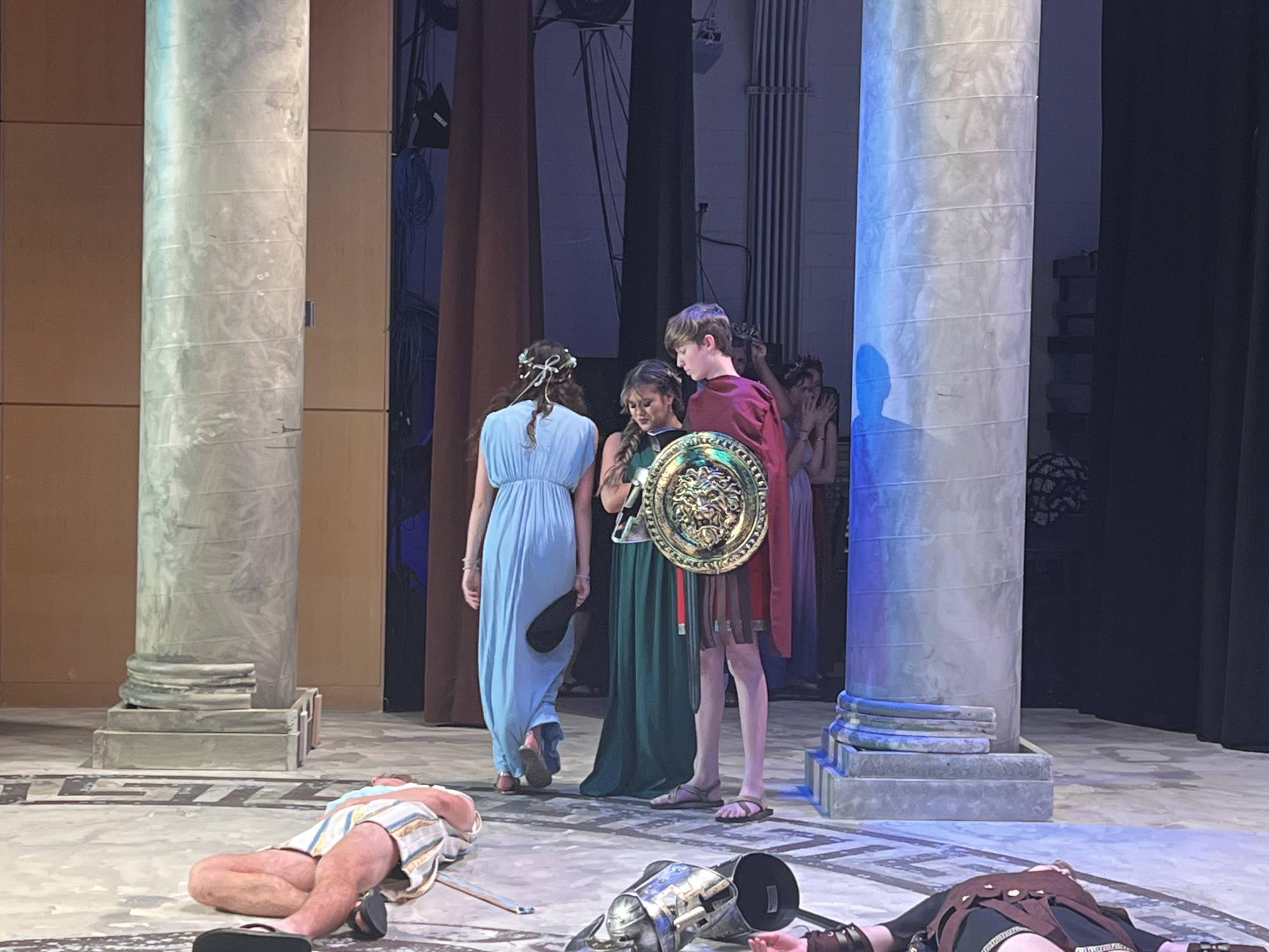For the past few weeks, one thing has consumed my mind. One thing has plagued all my waking hours and even begun to invade my subconscious thoughts. A Beret. Not beret’s as a concept or a fashion statement or even in its surprisingly deep historical context. No, just one beret.
If you didn’t have the pleasure of seeing Brebeuf’s production of “The Last Time I Saw Paris,” the show ends with several people, most notably the eponymous Paris (Max Adams ’25), strewn dead across the stage. At first, this sounds like a depressing and horrifying way to end a high school theater show, though in context the image is intensely insincere; every dead body seems to be winking at the audience. This insincerity falls in line with the comedy of the show: constantly breaking the fourth wall, looking the audience right in the eyes, and treating the surprisingly numerous character deaths with cutthroat unseriousness. The show revels in its absurdism.
No where else is this abstraction from death and consequence more seen than in The Beret. When the titular character, Paris, dies, his lover Helen (Maggie Webber ‘27) holds him as he passes on. This relationship is the core of the story, something the audience has seen start, grow, and then end right on stage. This moment is meant to be emotional. Surrounded by other bodies, Helen says her final goodbye to her lover. She kisses him on the forehead. She stands up and promises to bury him. The usual comedy of the show is almost absent here, ignoring the gratuitous kissing SFX, and the show finally creates a space for the audience to be truly invested in these characters. The audience wants to care about the characters on stage, to be moved by the acting and art in front of them. Then it happens: The Beret.

Helen stands up over Paris’ dead body and before she leaves, she promises she’ll come back after the fighting and bury him. At that moment, a beret is hurled on stage at her feet (props to Julia Watson ‘26), and it’s all over. The joke is that the word ‘bury’ kind of sounds like ‘beret’ and Helen comments on this, saying, “I said bury him not beret him.” The joke is dumb. The joke is unbelievably stupid. No one hears Helen’s earlier line and thinks that she said ‘beret’ instead of ‘bury’ and most of the time no one understands the joke at all. And yet, in its stupidity lies the joke’s perfection.
Before we understand the absolute perfection of the beret, we have to talk about absurdism. Briefly, absurdism is a philosophy akin to existentialism, stating that life and the universe are entirely irrational and that any search for meaning is an ultimately futile effort. Seminal thinkers like Albert Camus write that attempting to derive any ultimate meaning to the universe is in fact not just futile, but actively harmful to our experiences as humans. In essence, absurdism is the absence of, and the outright rejection, of any meaning at all.
In art, like live theater, Absurdism has to walk a fine line between sincerity and irony. Art is meant to convey the human experience, and most artists do this through the framework of a higher power or a deeper belief in the universe, but for the absurdist this is difficult. Absurdist art has to free itself from the tropes and archetypes of the past while still telling a sincerely human story. One of the greatest tools for this is irony, which allows an audience and an artist to detach themselves from their art and exemplify its absurdity. Leaning too far into detachment can result in a lack of sincerity, destroying any meaning the artist is attempting to articulate.

One of the best practical examples of this is, well, Rick and Morty (please don’t close this tab). The writers of Rick and Morty generally follow an absurdist view of the world and use that to frame the show. Because of the character of Rick having essentially god-like powers, consequences are irrelevant and life is practically meaningless for him. He leans full force into ironic detachment, not caring about anything or anyone, living solely to chase a hedonistic high that can never fully satiate him, leaving him alone, angry, and without any purpose.
Morty on the other hand (please stick with me), embraces the absurdity of his life, finding contentedness and sincerity inside his absurd reality. He knows that what he does may not have direct consequences, that he can just leave and move to a different reality at any time, but he chooses instead to find love and be complacent with the world around him. He finds the balance of irony, something necessary to recognize the absurd, and sincerity, something essential to the human experience. Leaning too hard into either side, as Rick does, causes direct harm to oneself and prevents them from being content in an absurd world.
This balance is something that all absurdist art struggles with.
Specifically in theater, absurdism has a long history, focusing mainly on the absurdity of the characters and situations they are in to communicate to the audience the plain absurdity of their own lives. Usually, absurdist plays follow the form of a barren stage, irrational characters, and a deep ironic detachment from consequence. We still care about these characters on the stage, but we also realize the deeply constructed and plastic world they inhabit. A good absurdist play (or Rick and Morty I guess), effectively straddles the line between sincerity and irony, reaching the absurd.
Now, what does this have to do with “The Last Time I Saw Paris”? The comedy in the play often breaks the fourth wall, the metaphorical barrier separating the characters on stage from the audience. Characters constantly wink at the audience, reference real life events, and generally do things ancient Greeks did not. Most of the jokes are entirely incoherent in the play’s context and setting, and while many comedies create humor using a contrast between a real historical setting (like ancient Greece) and modern references (like making jokes about Nike shoes). “The Last Time I Saw Paris” however, takes this to a whole new level with the beret.

The beret being thrown on stage forces the audience to recognize the physical parameters of the stage they’re watching. They become intensely aware of the curtains enclosing the stage, the limits of the world being built on stage, and the simple fact that the beret was thrown on by a teenager playing a part in a show (in this case the illustrious Julia Watson ‘26).
Beyond just making the audience recognize the fact that they are simply watching a play with actors, forcibly ejecting them from the world they are attempting to inhabit, it demolishes any and all of the story’s stakes. The beret differs because we have just watched one of the main characters, Paris, die. The audience wants to experience this, to feel sympathy for the grieving Helen and gain whatever we get from tragedies. But we can’t, because of a stupid joke about a beret. This moment takes the concept of death that is so prevalent on the stage (at this point it is littered with several bodies) and demolishes it, along with any attempt at sincerity.
While much of the play attempts to balance the ironic and the sincere, trying to keep us invested in the unfolding plot of the Trojan war while still keeping us laughing, but at this point the play almost gives up.
Everyone dies, and it’s funny that everyone dies.
We aren’t watching characters experiencing life anymore, it’s impossible. We’re watching people on a stage. The beret is such a charged and poignant moment because it destroys the audience’s ability to suspend their disbelief, to believe in the story being told to them. The moment the beret lands on the stage the audience is forced to confront the plastic, absurd world in front of them, but also the similarly absurd world they themselves live in.
In the end, the beret is just a really dumb joke. But it’s a joke that lets us laugh at one of the most terrifying concepts to the human mind, that it’s all meaningless. And if, in the end, it all really is, we can still find humor in that. People can die and we can still laugh and smile and go on with our day. We can be sincere, to experience all that the universe has to offer authentically, and still go to sleep at night with a healthy dose of screw-it-all.
The beret is dumb, the beret is stupid, but so are most things.





